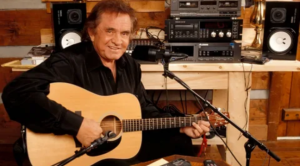
“The Long Black Veil” is a haunting and evocative song that has become a classic in the American folk music canon. Written by Marijohn Wilkin and recorded by Cash in 1964, the song tells the tragic tale of a man who is wrongfully convicted of murder and sentenced to death. While in prison, he receives news that his true love has died giving birth to their child. Haunted by guilt and despair, the man vows to wear a long black veil as a symbol of his sorrow and innocence.
The song’s simple yet powerful melody, combined with Cash’s deep and resonant voice, creates a sense of foreboding and melancholy. The lyrics are filled with vivid imagery and poignant emotions, painting a picture of a man consumed by grief and regret.
Historical Context
“The Long Black Veil” was released at a time of great social and political upheaval in the United States. The Civil Rights Movement was gaining momentum, and the Vietnam War was escalating. Cash, who was known for his outspoken views on social justice and his sympathy for the underdog, often used his music to address the issues of the day.
“The Long Black Veil” can be seen as a reflection of the anxieties and fears that many Americans were experiencing during this time. The song’s themes of injustice, loss, and despair resonated with a wide audience and helped to solidify Cash’s reputation as a folk music icon.
Musical Analysis
The song’s arrangement is relatively simple, featuring Cash’s vocals, acoustic guitar, and a string section. The melody is haunting and repetitive, creating a sense of unease and suspense. Cash’s vocal performance is particularly powerful, conveying a range of emotions from sorrow and anger to resignation and despair.
The lyrics of the song are filled with vivid imagery and poignant emotions. The opening verse sets the scene for the tragedy that is to unfold:
There once was a man who lived on the hill And he loved his wife more than life But one cold winter’s night He had to go out in the snow And leave his wife all alone
The image of the man leaving his wife alone in the snow foreshadows the tragedy that is to come. The following verses describe the man’s arrest and conviction for murder, and his subsequent descent into despair.
The chorus of the song is particularly haunting, with Cash repeating the lines “And I’ll wear a long black veil for my true love” over and over again. This refrain serves as a symbol of the man’s enduring grief and guilt.
The song concludes with a final verse in which the man reveals that he is innocent of the crime for which he was convicted. However, it is too late for him to reclaim his life or his love. The image of the man wearing a long black veil for the rest of his days is a powerful and poignant reminder of the consequences of injustice and the enduring nature of grief.
Legacy
“The Long Black Veil” has been covered by numerous artists over the years, including Joan Baez, Bob Dylan, and Willie Nelson. The song’s enduring popularity is a testament to its timeless themes and its ability to connect with audiences on a deep emotional level.
In addition to its musical significance, “The Long Black Veil” has also had a cultural impact. The song’s themes of injustice and loss have been explored in various forms of media, including film, television, and literature.
Video
Conclusion
“The Long Black Veil” is a haunting and evocative song that continues to resonate with audiences today. Its simple yet powerful melody, combined with Cash’s deep and resonant voice, creates a sense of foreboding and melancholy. The lyrics are filled with vivid imagery and poignant emotions, painting a picture of a man consumed by grief and regret.
The song’s historical context, musical analysis, and legacy all contribute to its enduring appeal. “The Long Black Veil” is a timeless classic that will continue to be enjoyed and appreciated for generations to come.